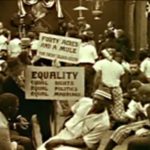James Basker & Johnathan Holloway discuss the novel written by Mr. Holloway, Jim Crow Wisdom: Memory & Identity in Black America Since 1940.
African American Religious Leadership and the Civil Rights Movement
The modern Civil Rights Movement was the most important social protest movement of the twentieth century. People who were locked out of the formal political process due to racial barriers were able to mount numerous campaigns over three decades to eradicate racial injustice and in the process transform the nation. In its greatest accomplishment, the Civil Rights Movement successfully eliminated the American apartheid system popularly known as Jim Crow. Registration is required to view this resource. Free registration for students and teachers required to access resource.
Learn About Black History, Culture and Politics
Learn about Black history in the United States before and after the Civil War; the Civil Rights Movement; the history of Africa; African American art; and African American trailblazers.
60-Second Civics Podcasts
60-Second Civics is a podcast that provides a quick and convenient way for listeners to learn about our nation’s government, the Constitution, and our history. The podcast explores themes related to civics and government, the constitutional issues behind the headlines, and the people and ideas that formed our nation’s history and government. The show’s content is primarily derived from the Center for Civic Education’s education for democracy curricula, including We the People: The Citizen and the Constitution, Foundations of Democracy, and Elements of Democracy. It’s easy to subscribe! Listen on iTunes or Stitcher or subscribe via RSS.
Brown v. Board of Education and its Effects on Civil Rights
Larry Kramer, former Dean of Stanford Law School and constitutional scholar, discusses Brown v. Board of Education and its effect on civil rights, and the question of resolving segregation.
Birth of a Nation, the NAACP, and the Balancing of Rights
Created Equal

The Created Equal project uses the power of documentary films to teach about the changing meanings of freedom and equality in America. The five films that are part of this project – “The Abolitionists,” “Slavery By Another Name,” “Freedom Riders”, “Freedom Summer” and “The Loving Story” – tell the remarkable stories of individuals who challenged the social and legal status quo, from slavery to segregation.
Brown v. Board of Education (1954) eLesson
After the Civil War, the 14th Amendment was passed to grant citizenship to former slaves and protect them from civil rights violations in their home states. Public schools were relatively rare throughout the United States, but were often segregated by race where they existed. The same Congress that passed the 14th Amendment created racially segregated schools for the District of Columbia. In the 20th century, the National Association for the Advancement of Colored People (NAACP) began a litigation campaign designed to bring an end to state mandated segregation, calling attention to the shabby accommodations provided for blacks, as well as arguing the damaging psychological effects that segregation had on black school children. One case was brought on behalf of Linda Brown, a third-grader from Topeka, Kan.
